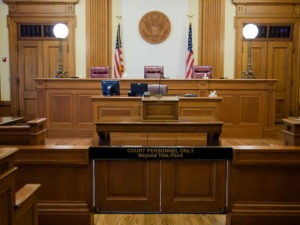What used to be a daily experience has now become very uncommon. Going to court is what we do in our practice. Whether we are putting a case on the record or having a contested trial, we are very familiar with being in the courthouse. Since this pandemic has hit us, we have had the privilege to make it into the courthouse for a handful of hearings.
After going to court, we have been asked what it is like? I’ll answer the question in the context of what the experience is like. There are many blogs and articles on what matters the court is hearing and what matters the court is continuing past the pandemic.
As often as we go to court, we develop friendships with colleagues, deputies and many others at the courthouse. A great part of being able to go to court has certainly been the opportunity to see familiar faces and have a chance to make sure all are well.
Courthouses, especially state courthouses, often have very large dockets. These dockets range in purpose from civil or criminal matters. Only a month ago when you would enter the courthouse you would be greeted by a guard, screened for security and then make your way through large groups of people to find your designated courtroom. Once in the courtroom, you would find a seat anywhere you like, often asking others to scoot over to give you room, and then wait your turn for your case to be called. This is not what you will experience now.
Now that we have orders limiting the amount of hearings being held and the concern of limiting this outbreak, what you will now experience is starkly different.
As you walk to the courthouse you are first going to be struck by the emptiness of the town surrounding the courthouse. What is normally a place that can be difficult to find parking is full of open parking spots. Most equivalent to an early Sunday morning, there are very few cars driving or parked around the courthouse.
As you approach the courthouse you will be greeted by a guard, a guard instructed to ask a list of questions to ensure that you are not symptomatic or ill. What used to be a line of people waiting to be screened has now become what feels like private access to your own courthouse.
Making it past security you will not likely see anyone in the lobby, stairs, hallways or other areas that people usually congregate. Instead, you will enter the courtroom, sit in an assigned seat and wait for the judge to enter the courtroom.
The experience is surreal in that courthouses have always been a place of many people. Buildings open to the public and full of litigants have now become a place for only the most necessary hearings.
What I have quickly come to realize is that, as with any occupation, the time spent with others and the relationships you become used to will likely be the most missed when forced to be apart.

